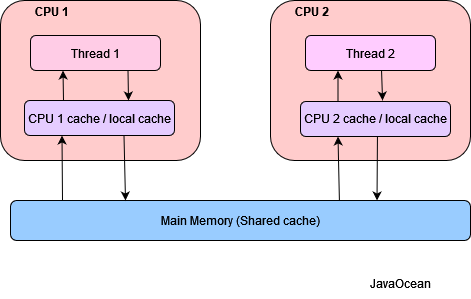The Java volatile keyword is used to mark a Java variable as “being stored in main memory”, means that every read of a volatile variable will be read from the computer’s main memory, and not from the CPU registers, and that every write to a volatile variable will be written to main memory, and not just to the CPU registers.
Volatile Variables
The volatile keyword in Java plays a pivotal role in concurrency, ensuring variable consistency across threads. The volatile keyword indicate that a variable’s value may be modified by multiple threads concurrently.
It ensures that all threads see the most up-to-date value of the volatile variable, preventing any caching or optimization issues that may arise due to thread-specific local copies.
In a multi-threaded environment, each thread usually maintains its own copy of variables in CPU caches for faster access. This optimization can lead to a situation where different threads have different values of the same variable, causing inconsistency and unexpected behavior. The volatile keyword addresses this issue by enforcing a “happens-before” relationship, which ensures that changes made to a volatile variable are visible to all threads.
When to Use volatile Keyword in Java?
The use of the volatile keyword is important in scenarios where multiple threads are accessing shared variables. Without volatile, there can be issues with memory visibility and reordering.
In such cases, the values written by one thread may not be immediately visible to other threads, leading to incorrect or unexpected results.
By declaring a variable as volatile, we ensure that updates to that variable are immediately visible to other threads. It prevents the processor and compiler from reordering instructions involving the volatile variable, maintaining the intended program order.
Volatile Important Points
- Using the volatile keyword is limited to variables, and it is not allowed for classes or methods. When applied to a variable, volatile ensures that its value is always read from the main memory instead of the local thread cache.
- When a variable is declared as volatile, the operations of reading and writing to it become atomic, meaning they are indivisible and can’t be interrupted.
- The use of volatile reduces the risk of memory consistency errors, ensuring that changes made by one thread are visible to other threads.
- In Java, writing to a volatile variable establishes a “happen before” relationship, guaranteeing that subsequent reads of that variable will see the most up-to-date value.
- Volatile variables are always visible to other threads, ensuring their changes are immediately seen by other concurrent threads.
- It’s important to note that a volatile variable, if it’s an object reference, may have a null value.
- If a variable is not shared between multiple threads, there is no need to use the volatile keyword for that variable.

Consider the following code snippet:
public class SharedCounter {
private volatile int count;
public void increment() {
count++;
}
public int getCount() {
return count;
}
}
In this example, the “count” variable is marked as volatile. If multiple threads are concurrently accessing and modifying the “count” variable using the increment() method, the volatile keyword guarantees that all threads will see the updated value. Without the volatile modifier, each thread might cache its own copy of the variable, resulting in inconsistent or outdated values.
The volatile keyword also provides an atomicity guarantee for read-modify-write operations, such as incrementing a counter. In the above example, even though the increment operation involves multiple steps (reading, modifying, and writing the value), the volatile keyword ensures that these steps are executed atomically, without any interference from other threads.
Analogy: Imagine you’re attending a team meeting, and the team leader shares an important number that everyone needs to know. By using a volatile variable, the leader ensures that every team member receives the latest value and avoids any confusion due to outdated or cached information. It’s like having a synchronized communication channel that updates everyone simultaneously.
Conclusion
- Visibility problem can be easily fixed with the ‘Volatile’ keyword that will guarantee and keep all the local cache of the cores in your application updated.
- Threads cannot be kept blocked in waiting with volatile, but it is possible to keep threads in waiting state when using ‘synchronized’.
- Volatile variables are not as fast as normal variables, and they cause reading and writing to be slower due to access to memory at each step.
- Cache memory accessibility is always faster than accessing RAM.
